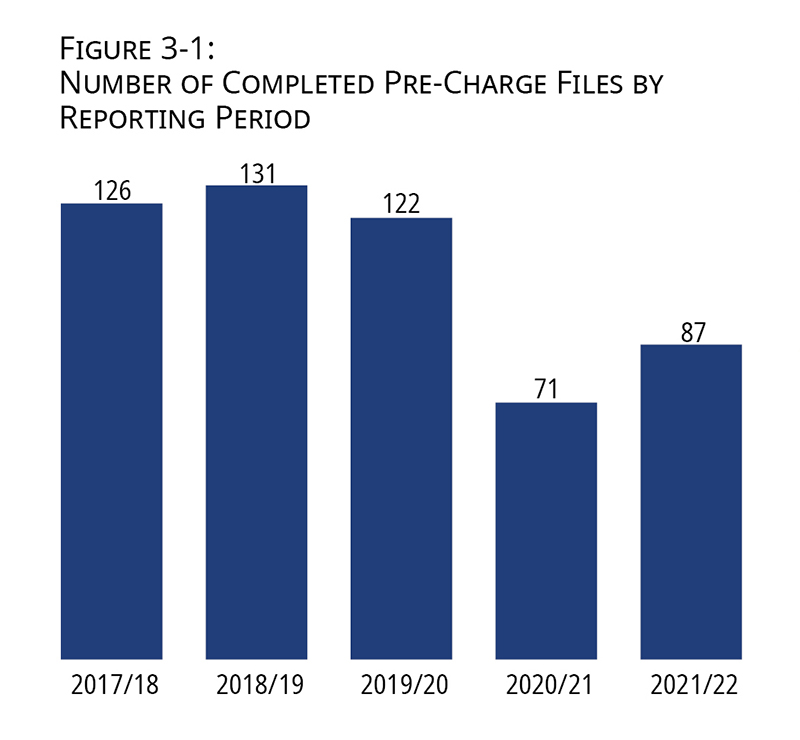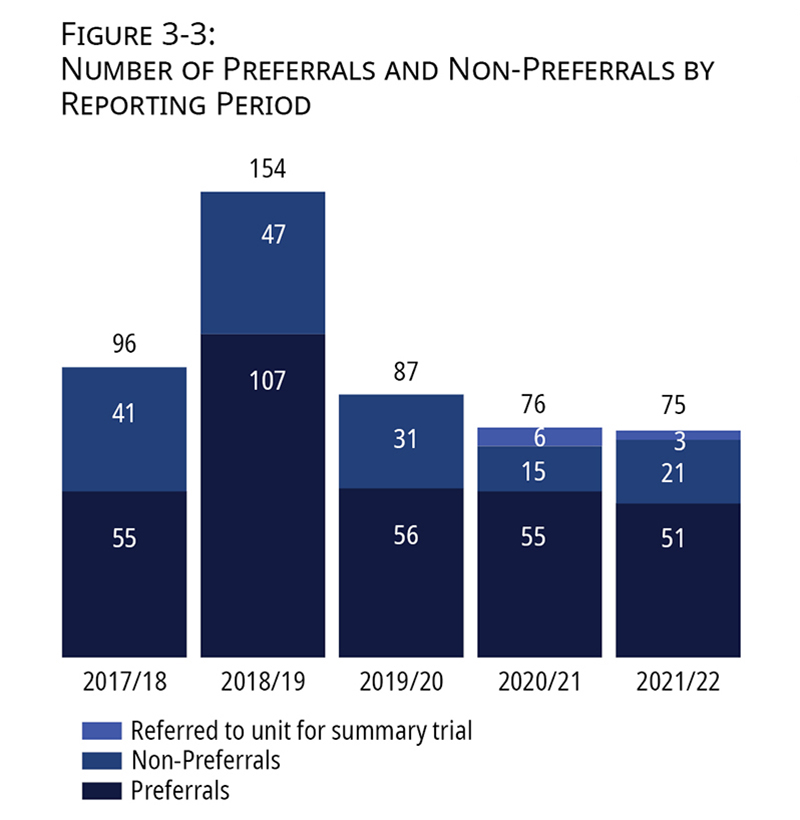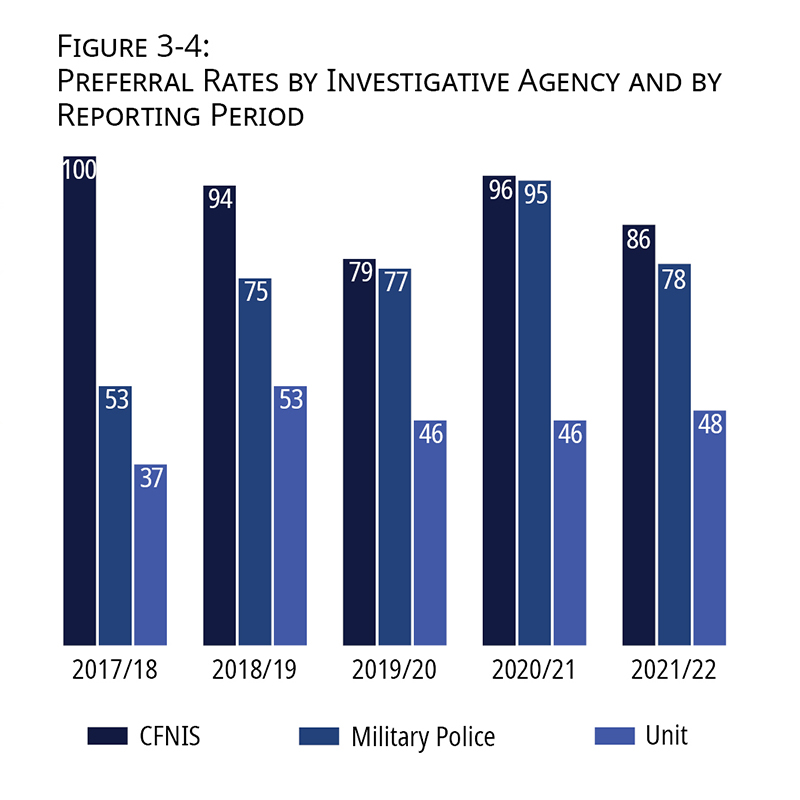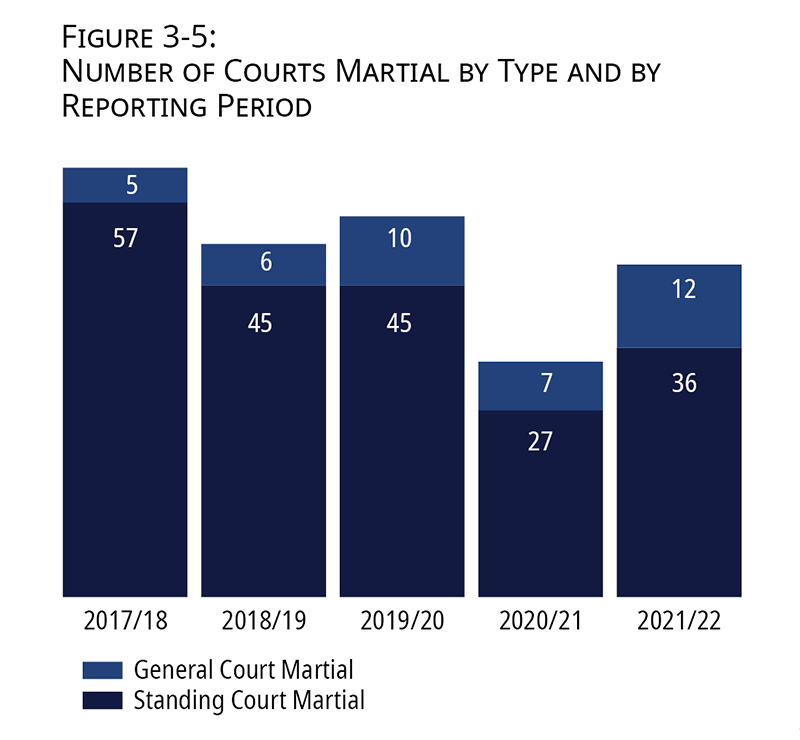Chapter Three: Year in Review
The information and analysis provided below reflects the operations of the CMPS pertaining to pre-charge advice, referrals, post-charge reviews, courts martial, and custody review hearings over the course of the reporting period.
Overview
The CMPS’s total court martial caseload for the reporting period consisted of 105 files: 91 referrals were received during the reporting period and 14 files were carried over from the previous reporting period.
In addition, the CMPS managed 87 requests for pre-charge advice, twenty (20) appeals to the CMAC and six (6) appeals to the SCC, for a total of 218 files over the course of the current reporting period (pre-charge, referral and appeal files combined).
Military judges are, in certain circumstances, required to review orders made to retain a CAF member in service custody. The DMP represents the CAF at all such hearings. There were no custody review hearings during this reporting period.
Finally, a total of 48 courts martial were completed.
The COVID-19 Pandemic
The COVID-19 pandemic presented prosecution services across Canada with unprecedented challenges and limitations on bringing matters before the courts. The CMPS was able to quickly adapt to the new reality of prosecuting cases in the pandemic environment and has proven itself to be operationally focused and responsive. In this third year of the pandemic, courts martial continue to proceed safely and efficiently. The physical presence of parties and witnesses at court martial proceedings is starting to return to pre-pandemic levels, requiring RMPs to resume their travel across Canada. Successfully prosecuting cases in the new COVID-19 environment has demonstrated that the CMPS is a small, but highly adaptable and agile component of the military justice system, which can achieve desired outcomes in any environment.
Impact of Recommendations Made by Review Authorities
On 29 April 2021, the MND appointed former Supreme Court Justice, the Honorable Madame Louise Arbour, to conduct an independent and comprehensive review of sexual misconduct in the CAF. The terms of reference provided the authority for Madame Arbour to issue any interim recommendations to address issues for immediate action that may become apparent during the conduct of the review.
On 30 April 2021, The Honorable Mr. Morris J. Fish tabled his Report of the Third Independent Review Authority to the MND, who made a total of 107 recommendations including a number of recommendations regarding the independence of military justice actors and how sexual misconduct should be addressed in the military justice system.
On 20 October 2021, Madame Arbour issued an interim recommendation to implement recommendation 68 of Mr. Morris J. Fish and to immediately transfer to civilian police forces all cases involving sexual assaults and other offences of a sexual nature under the Criminal Code, including allegations that were under investigation by the CFNIS, and in all cases, that charges be laid in civilian courts. This interim recommendation focused on cases that were at the pre-charge stage.
On 5 November 2021, the Canadian Forces Provost Marshal (CFPM) and the DMP issued a joint statement indicating their acceptance of Madame Arbour’s interim recommendation.
On 26 November 2021, the DMP issued an interim direction to his RMPs regarding the implementation of Madame Arbour’s interim recommendation. The DMP provided clear direction as to how to manage cases involving sexual assaults and other offences of a sexual nature under the Criminal Code that had already been referred to the DMP for disposal, or were in the process of being referred to the DMP. At the time of Madame Arbour’s interim recommendation, the CMPS had a total of 33 such cases.
Meetings with complainants in all of the 33 cases were conducted in accordance with the DMP’s interim direction in order to explain the effects of Madame Arbour’s interim recommendation and seek their views as to jurisdiction. In all but two cases, complainants indicated their preference for the matters to continue to proceed within the military justice system.
For this reason, while the CMPS has stopped accepting new cases involving sexual assaults and other offences of a sexual nature under the Criminal Code since Madame Arbour’s interim recommendation, RMPs will nevertheless continue to conduct courts martial involving this type of offence over the course of the next reporting period.
Pre-Charge Advice
RMPs within the CMPS are responsible to provide pre-charge advice to both the CFNISFootnote 17 and to unit legal advisors.Footnote 18 In this reporting period, 91 requests for pre-charge advice were sent to the CMPS and 9 requests had been pending from the previous reporting period. Of the 100 total requests, 87 pre-charge advice files were completed during this reporting period, leaving 13 files still pending at the end of the current reporting period.
The number of completed pre-charge advice files is lower than the average number of completed files over the past four reporting periods (105). It is likely that the pandemic had a direct impact on the amount of requests for pre-charge received by CMPS during the reporting period. It is anticipated that as pandemic restrictions subside, and the CAF returns to normal operational activities, the number of requests for pre-charge advice will increase.
Figure 3-1 shows the number of completed pre-charge files for the last four reporting periods.
Figure 3-1: Number of Completed Pre-Charge Files by Reporting Period

Graph breakdown - Figure 3-1: Number of Completed Pre-Charge Files by Reporting Period
| 2017/18 | 2018/19 | 2019/20 | 2020/21 | 2021/22 | |
|---|---|---|---|---|---|
| Completed Pre-Charge Files | 126 | 131 | 122 | 71 | 87 |
Referrals and Post-Charge Reviews
Number of Referrals Received During the Reporting Period
During this reporting period, 91 referrals were received by the DMP. This is an increase of 15 referrals in comparison to the last reporting period (from 76 to 91).
Caseload for the Reporting Period
When combined with the 14 files that were carried over from the previous reporting period, the caseload for this reporting period was 105 files.Footnote 19
Figure 3-2 shows the number of files handled for the past five reporting periods.
Figure 3-2: Caseload by Reporting Period

Graph breakdown - Figure 3-2: Caseload by Reporting Period
| 2017/18 | 2018/19 | 2019/20 | 2020/21 | 2021/22 | |
|---|---|---|---|---|---|
| Referrals Carried Over From Previous Year | 81 | 70 | 54 | 47 | 14 |
| Referrals Received | 118 | 102 | 76 | 76 | 91 |
| Total | 199 | 172 | 130 | 123 | 105 |
Preferrals, Non-Preferrals and Referral of Charges to Unit for Summary Trial
During this reporting period, post-charge decisions were made by an RMP in 75 files, while 30 files were still pending a prosecutorial decision at the end of the current reporting period.
Of the 75 completed files, 51 files led to one or more charges being preferred for court martial, 21 files were not preferred and three (3) files were referred back to the originating unit to try the accused person by summary trial. The preferral rate for this reporting period is 68%.
Figure 3-3 shows the number of preferrals, non-preferrals and referral of charge to unit for summary trial for the past five reporting periods.
Figure 3-3: Number of Preferrals and Non-Preferrals by Reporting Period

Graph breakdown - Figure 3-3: Number of Preferrals and Non-Preferrals by Reporting Period
| 2017/18 | 2018/19 | 2019/20 | 2020/21 | 2021/22 | |
|---|---|---|---|---|---|
| Referral to unit for summary trial | 0 | 0 | 0 | 6 | 3 |
| Non-Preferrals | 41 | 47 | 31 | 15 | 21 |
| Preferrals | 55 | 107 | 56 | 55 | 51 |
| Total | 96 | 154 | 87 | 76 | 75 |
Preferral Rates by Investigative Agency
Although all files referred to the DMP are received through a referral authority, the incident giving rise to the charge may be investigated by one of three military investigative agencies: the CFNIS, an investigator with the military police who is not a member of the CFNIS, or a unit investigator. As such, the rate of preferrals varies between investigative agencies as their investigators have different levels of experience, proficiency and training.
During this reporting period, the preferral rate for those files investigated by the CFNIS was 86%. This preferral rate is slightly higher than that of the regular military police (78%), but is markedly higher than that of unit investigators (48%).Footnote 20
This divergence of preferral rates has been consistent over the past several years, with those investigations conducted by the CFNIS being preferred at a higher rate than unit investigators.
For a complete overview of preferral rates by investigative agency over the past five reporting periods, please refer to Figure 3-4.
Figure 3-4: Preferral Rates by Investigative Agency and by Reporting Period

Graph breakdown - Figure 3-4: Preferral Rates by Investigative Agency and by Reporting Period
| 2017/18 | 2018/19 | 2019/20 | 2020/21 | 2021/22 | |
|---|---|---|---|---|---|
| CFNIS | 100 | 94 | 79 | 96 | 86 |
| Military Police | 53 | 75 | 77 | 95 | 78 |
| Unit | 37 | 53 | 46 | 46 | 48 |
Courts Martial
This section provides an overview and analysis of cases heard at a court martial during the reporting period. For a complete list of all courts martial heard during the reporting period, please refer to Annex A.
Number of Courts Martial
A total of 48 courts martial were completed during this reporting period. Of those, 36 were SCMs and 12 were GCMs. There has been an increase in comparison to the last reporting period and the annual number of courts martial appears to be returning to normal historical levels, likely associated with the relaxation of restrictions associated with the COVID-19 pandemic.
Figure 3-5: Number of Courts Martial by Type and by Reporting Period

Graph breakdown - Figure 3-5: Number of Courts Martial by Type and by Reporting Period
| 2017/18 | 2018/19 | 2019/20 | 2020/21 | 2021/22 | |
|---|---|---|---|---|---|
| General Court Martial | 5 | 6 | 10 | 7 | 12 |
| Standing Court Martial | 57 | 45 | 45 | 27 | 36 |
Notable Court Martial Cases
This section provides a summary of notable courts martial that were held during this reporting period. Please refer to Annex A for an overview of all the courts martial held during this reporting period.
R v Pte August
Pte August was charged with three counts of sexual assault and was found guilty of two of the charges. He was ultimately sentenced to imprisonment for six months (the carrying into effect of the punishment of imprisonment has been suspended) following a very long trial, marked by a myriad of adjournments. The trial commenced on 13 August 2018 and was finally concluded on 18 February 2022.
The case for the prosecution was heard during the week of 13 August 2018. At the close of the prosecution case, the accused, through his counsel, presented a motion of no prima facie case on the first charge. The motion was granted and resulted in a finding of not guilty on that charge. This left the court with two charges to deal with instead of three. The case was then adjourned to 22 October 2018 for the presentation of the case for the defence.
Unfortunately, the trial was further delayed following the decision in R v Beaudry, 2018 CMAC 4 delivered on 19 September 2018, which declared s. 130(1)(a) of the NDA to be of no force or effect in its application to any civil offence for which the maximum sentence is five years or more. The Supreme Court of Canada overturned Beaudry on 26 July 2019 and confirmed the constitutional validity of s. 130(1)(a) of the NDA. While this decision technically allowed the court martial to resume, the case was further adjourned to 20 April 2020 due to unavailability of defence counsel until then. Before the case could resume, the COVID-19 pandemic led to a suspension of all court martial activities from 16 March 2020 to 31 May 2020.
The defence presented its case between 21 and 31 July 2020 and raised a defence of automatism, positing that the accused was in a state of parasomnia during the alleged offence. The defence called expert evidence in support of this claim. A second expert was also called by the prosecution and authorized by the Court to provide expert opinion evidence on sleep disorders. He concluded that the results of the tests conducted by the expert called by the defence would have been sufficient to make a diagnosis of sleepwalking, but insufficient to reveal anything about what could have occurred on the morning of the incidents or at any other specific time in the past.
The parties delivered their submissions on finding between 5 and 7 August 2020. On 30 April 2021, the court found the accused guilty on the two remaining charges.
As a result of additional requests for adjournments presented by the defence, sentencing was delayed to 14 February 2022. The sentence was pronounced on 18 February 2022.
R v Bdr Cogswell
Bdr Cogswell was found guilty of one charge laid pursuant to s. 93 of the NDA (disgraceful conduct) and of eight charges laid pursuant to s. 130 of the NDA for having administered a noxious thing contrary to s. 245(1)(b) of the Criminal Code.
On 21 July 2018, Bdr Cogswell, known as Bdr Fraser at the time of the alleged incident, distributed a dozen cupcakes she had baked and laced with cannabis while she was working at the mobile canteen. Bdr Cogswell was responsible for manning and supporting a mobile canteen that provided snacks and supplies to the soldiers while in the field.
The members who consumed the cupcakes unaware that the contained cannabis were all scheduled to conduct the live fire portion of Exercise COMMON GUNNER at Canadian Forces Base Gagetown, New Brunswick. Shortly after receiving the cupcakes from Bdr Cogswell, the complainants experienced symptoms to varying degrees, all consistent with the ingestion of cannabis.
Bdr Cogswell was sentenced to imprisonment for a period of 30 days, dismissal from Her Majesty’s service and a reduction in rank to the rank of Gnr. The court outlined many aggravating factors, including the serious safety risk arising from the surreptitious distribution of cannabis during a live artillery range, the effect on the eight innocent victims, the violation of their personal integrity they felt, the degree of premeditation and the offender’s attempt to inculpate other innocent personnel during the investigation to exculpate herself.
R v Pte Waugh
Pte Waugh was found not responsible on account of mental disorder on one charge of sexual assault contrary to s. 271 of the Criminal Code, an offence punishable under s. 130 of the NDA. This is a rare case where the evidence in support of the contention that Pte Waugh was in a state of automatism, namely parasomia, was so compelling that it led the prosecution to not oppose the theory of the defence. The court determined that it should not hold a disposition hearing pursuant to s. 202.15(1) of the NDA, and referred the case to the appropriate review board for disposition.
R v MS Machtmes
MS Machtmes was found guilty of three charges. His unfortunate death following the finding of guilt of the GCM led to an abatement of the proceedings before sentencing could take place.
Two of the charges were laid contrary to s. 130 of the NDA, that is to say, for luring a child, contrary to s. 172.1(1)(b) of the Criminal Code and invitation to sexual touching, contrary to s. 152 of the Criminal Code. The third charge involved an allegation of disgraceful conduct, contrary to s. 93 of the NDA.
All charges stemmed from a series of sexualized conversations via social media with a fifteen-year old Australian citizen, initiated by MS Machtmes while he was deployed on operations off the coast of Australia.
The court martial proceeded during the COVID-19 restrictions. Following an application by the prosecution, and despite the objection of the defence, the court allowed the four Australian witnesses called by the prosecution to testify via video-link. The court relied on s. 179(1)(a) of the NDA, which provides a court martial with the ability to control its own processes with respect to the attendance, swearing and examination of witnesses.
The court determined that testimony via video-link was the most appropriate means to elicit the truth from the Australian witnesses, in light of the severe restrictions on travel that were in place at the time. The court preferred the video-link to the other option, which would have involved the taking of evidence on commission pursuant to s. 184 of the NDA. The court deemed that the video-link was the means that would more appropriately serve the interests of the accused.
Court Martial Appeal Court
The appeal section of the CMPS was busy during the year. For the complete list of the cases heard and ongoing at the CMAC throughout the year, please consult Annex B. For the list of SCC cases, please consult Annex C.
Two cases were particularly notable given the importance of the issues they raised: McGregor and Edwards et al.
Decisions Rendered or Appeals Initiated at the CMAC
R v McGregor, 2020 CMAC 8
Following the CMAC decision in McGregor on 31 December 2020, Cpl McGregor sought leave to appeal at the SCC. Leave was granted on 14 October 2021.
At his SCM, Cpl McGregor was found guilty of sexual assault under s. 130 of the NDA (contrary to s. 271 of the Criminal Code); of two counts of voyeurism under s. 130 of the NDA (contrary to s. 162(1) of the Criminal Code); of one count of possession of a device for surreptitious interception of private communications under s. 130 of the NDA (contrary to s. 191(1) of the Criminal Code); of one count of cruel or disgraceful conduct, contrary to s. 93 of the NDA; and, of one count of conduct to the prejudice of good order and discipline, contrary to s. 129 of the NDA. He was sentenced to imprisonment for a period of 36 months and dismissal with disgrace from Her Majesty’s service.
The main issue in this case is whether or not s. 8 of the Charter found application with regard to the search of Cpl McGregor’s residence in the State of Virginia, USA.
This case is interesting for the military justice system since it highlights its differences from any other Canadian jurisdiction. Normally, the Charter does not find application outside Canada since Parliament does not have, in general, the jurisdiction to enforce Canadian laws in foreign states.
This means, for instance, that accused are prohibited, at their trial, to seek the exclusion of evidence seized outside Canada under s. 24(2) of the Charter. Though such accused can nonetheless request for that evidence to be excluded if its admission renders his or her trial unfair pursuant to ss. 7 and 11(d) of the Charter.
Since the CSD (which is embedded in the NDA) operates outside Canada, the Charter does find application when it is enforced on a foreign territory. Such jurisdiction comes either from the consent of the host nation or under the umbrella of Canada’s obligation under international law to maintain control over its forces. It is an example, as alluded to in R v Hape, 2017 SCC 26, of a rare instance where the Charter will apply abroad with another country’s permission or by the action of another permissive rule of international law.
In the case of Cpl McGregor, Canada’s enforcement jurisdiction came from the North Atlantic Treaty Organisation – Status of Forces Agreement (NATO SOFA), of which both the US and Canada are signatories. This agreement provided military investigators complete jurisdiction over Cpl McGregor. However, by the terms of the NATO SOFA, Cpl McGregor’s residence, by its location, fell outside the reach of the direct enforcement powers of the CAF. Military investigators had to seek assistance, and obtain a warrant, from US authorities.
Cpl McGregor claims that the search of his home in Virginia, US, and the subsequent seizure and search of his electronics devices, though authorized by a US warrant, was unlawful and in breach of s. 8 of the Charter. This proposition was dismissed by the Military Judge and the CMAC.
The MND, for Her Majesty in this appeal, claims that while the Charter applied to every other investigative step on that file, it did not, and could not, apply to the search of Cpl McGregor’s residence since the search, conducted under Virginia law, was not a “matter within the authority of Parliament” (i.e., s. 32 of the Charter).
The hearing took place on 19 May 2022 and the SCC reserved its decision.
Supreme Court of Canada
Decision Rendered
There were no decisions rendered by the SCC in the course of this reporting period.
Applications for leave to appeal to the SCC
Independence and Impartiality of Military Tribunals
As it was reported last year, a series of court martial decisions pertaining to the independence and impartially of our military tribunals under s. 11(d) of the Charter were appealed by the DMP. These appeals were allowed by the CMAC and new trials were ordered for several accused on 11 June 2021 (Edwards et al., 2021 CMAC 2).
On 10 September 2021, the accused in Edwards et al. sought leave to appeal to the SCC. Since then, several other military accused have sought leave from the SCC on the same grounds: R v Proulx and Cloutier, 2021 CMAC 3; R v Christmas, 2022 CMAC 1; R v Brown, 2022 CMAC 2; R v Thibault, 2022 CMAC 3.
The SCC has yet to decide if leave will be granted.